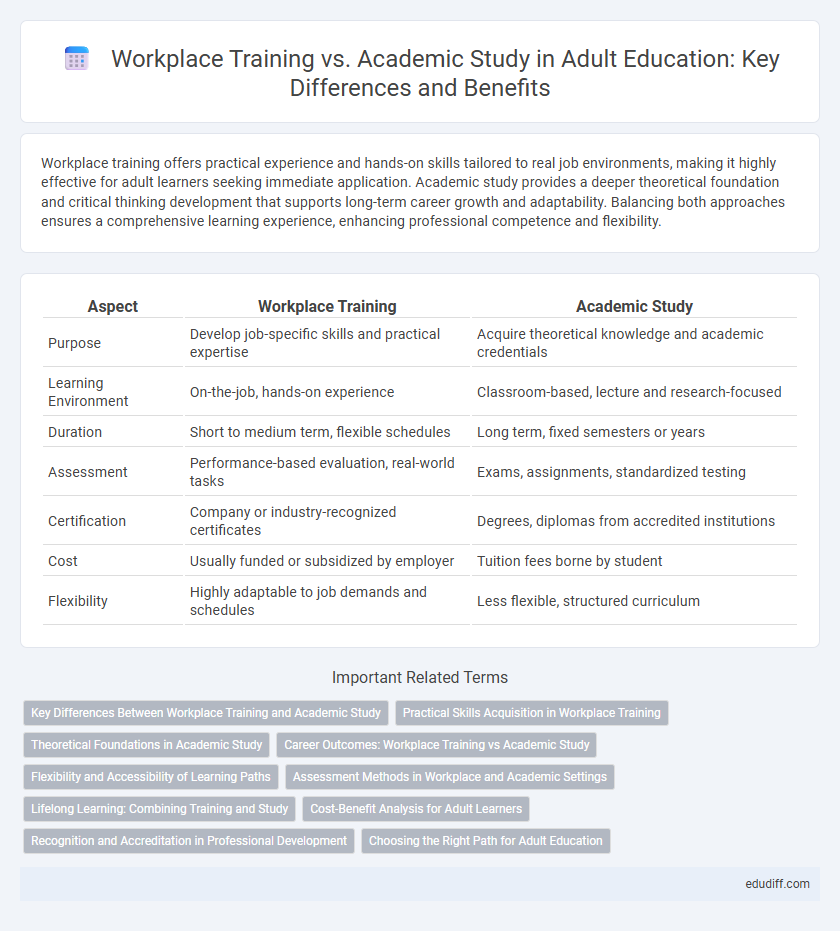Workplace training offers practical experience and hands-on skills tailored to real job environments, making it highly effective for adult learners seeking immediate application. Academic study provides a deeper theoretical foundation and critical thinking development that supports long-term career growth and adaptability. Balancing both approaches ensures a comprehensive learning experience, enhancing professional competence and flexibility.
Table of Comparison
| Aspect | Workplace Training | Academic Study |
|---|---|---|
| Purpose | Develop job-specific skills and practical expertise | Acquire theoretical knowledge and academic credentials |
| Learning Environment | On-the-job, hands-on experience | Classroom-based, lecture and research-focused |
| Duration | Short to medium term, flexible schedules | Long term, fixed semesters or years |
| Assessment | Performance-based evaluation, real-world tasks | Exams, assignments, standardized testing |
| Certification | Company or industry-recognized certificates | Degrees, diplomas from accredited institutions |
| Cost | Usually funded or subsidized by employer | Tuition fees borne by student |
| Flexibility | Highly adaptable to job demands and schedules | Less flexible, structured curriculum |
Key Differences Between Workplace Training and Academic Study
Workplace training emphasizes practical skill development, real-time problem-solving, and direct application of knowledge in professional settings, whereas academic study prioritizes theoretical understanding, research, and comprehensive subject exploration. Workplace training often involves hands-on experiences, mentorship, and performance evaluations, contrasting with academic assessments like exams, essays, and thesis work. The key difference lies in the objectives: workplace training aims to enhance job-specific competencies, while academic study fosters critical thinking and broad intellectual growth.
Practical Skills Acquisition in Workplace Training
Workplace training emphasizes hands-on experience and real-world application, accelerating practical skills acquisition by immersing learners in actual job environments. Unlike academic study, which often concentrates on theoretical knowledge, workplace training facilitates immediate skill development through direct interaction with tools, processes, and workplace challenges. This approach enhances job readiness and adaptability by aligning training objectives with industry-specific demands and performance metrics.
Theoretical Foundations in Academic Study
Theoretical foundations in academic study provide a structured framework of principles, concepts, and methodologies essential for comprehensive understanding and critical analysis. Academic curricula emphasize epistemology, cognitive theories, and disciplinary paradigms that underpin knowledge construction and scholarly inquiry. This rigorous theoretical grounding equips learners with analytical tools that go beyond practical skills, fostering lifelong learning and innovation.
Career Outcomes: Workplace Training vs Academic Study
Workplace training offers practical skills and hands-on experience that often lead to faster employment and higher immediate job readiness compared to academic study. Academic study provides theoretical knowledge and critical thinking skills, which can open doors to advanced career opportunities and higher earning potential in the long term. Balancing both approaches enhances career outcomes by combining practical expertise with foundational understanding, increasing job flexibility and growth potential.
Flexibility and Accessibility of Learning Paths
Workplace training offers greater flexibility and accessibility by allowing adults to learn on-the-job and tailor skills development to immediate career needs, often through modular or online platforms. Academic study typically involves structured schedules and longer time commitments, which may limit accessibility for working professionals seeking to balance education with personal responsibilities. Flexible workplace training programs enhance continuous learning by accommodating diverse learning paces and real-time application of skills.
Assessment Methods in Workplace and Academic Settings
Workplace training assessment methods prioritize practical evaluations such as on-the-job observations, performance appraisals, and real-time feedback to measure competency and skill application. Academic study assessments typically involve standardized tests, written exams, and coursework evaluations designed to gauge theoretical understanding and knowledge retention. The integration of formative assessments in both settings enhances skill development and ensures alignment with learning objectives and professional standards.
Lifelong Learning: Combining Training and Study
Workplace training equips adults with practical skills and real-time problem-solving experience essential for career advancement, while academic study deepens theoretical knowledge and critical thinking. Combining both approaches fosters lifelong learning by integrating hands-on expertise with intellectual development, enhancing adaptability in ever-evolving job markets. This hybrid model improves professional competence and supports continuous personal growth across various industries.
Cost-Benefit Analysis for Adult Learners
Workplace training offers adult learners immediate practical skills that can lead to faster job advancement and higher earning potential, often at a lower cost compared to academic study. Academic programs usually require significant time and financial investment but provide comprehensive theoretical knowledge and credentials with long-term career benefits. Evaluating the cost-benefit ratio, workplace training typically delivers quicker returns on investment, while academic study supports broader career opportunities and professional growth.
Recognition and Accreditation in Professional Development
Workplace training offers practical, hands-on experience that is often immediately recognized by industry employers, enhancing professional credentials in real-world scenarios. Academic study provides formal accreditation through accredited institutions, which is widely accepted for career progression and professional licensing. Combining both methods maximizes recognition and accreditation, ensuring comprehensive development and validation of skills in professional development.
Choosing the Right Path for Adult Education
Workplace training offers practical, hands-on skills directly applicable to specific job roles, enhancing immediate employability and career advancement. Academic study provides a deeper theoretical foundation and critical thinking abilities, beneficial for long-term professional growth and specialized fields. Adults should evaluate their career goals, learning preferences, and industry demands to determine whether experiential learning or formal education best aligns with their development needs.
Workplace training vs Academic study Infographic

 edudiff.com
edudiff.com